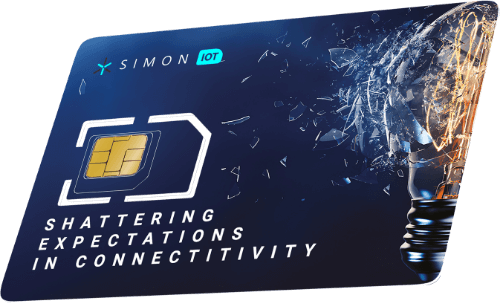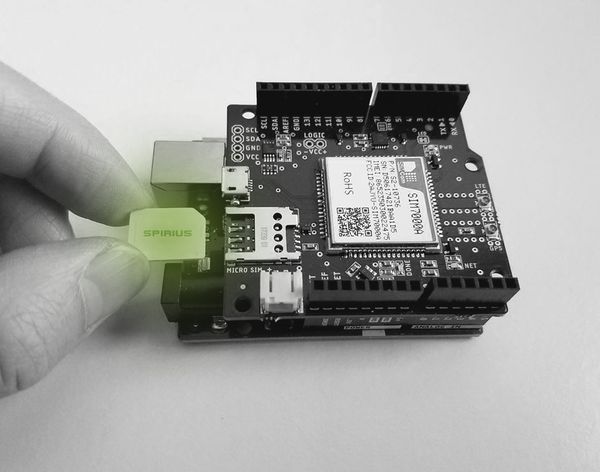Hologram Iot Sim Card IoT SIM cards
Hologram Iot Sim Card IoT SIM cards
Blog Article
Hologram Iot Sim Card SIM cards stopped working IoT Modules

The integration of Internet of Things (IoT) technologies into various sectors has remodeled how units work together and communicate. Central to this transformation is the function of SIM cards in IoT connectivity. These small, invaluable elements are essential in facilitating safe communication between devices and networks, enabling seamless data switch and distant administration.
First, understanding the normal function of SIM cards helps contextualize their significance in IoT. Originally developed for cellphones, SIM cards authenticate units on a cellular network, offering a secure means of identity verification. Beyond individual users, this capability has expanded into the realm of IoT, where countless devices now rely on this know-how to attach and talk (Nb-Iot Sim Card).
Hologram Iot Sim Card Freeway simHERO IoT Prepaid SIM
The variety of devices utilizing SIM playing cards in IoT is outstanding, starting from smart meters and wearables to automotive methods and industrial equipment. Each of those functions presents unique challenges and requirements for connectivity. The presence of a SIM card in every gadget ensures that these numerous elements can function effectively within a bigger community infrastructure.

IoT applications often require real-time data exchange, making a dependable connection essential. SIM playing cards allow units to connect directly to cellular networks, providing not only flexibility but additionally mobility. This is especially advantageous for purposes that require gadgets to function in remote or difficult environments, the place traditional wired connections may not be feasible.
Iot Sim Card copyright What Is An IoT SIM Card?
Increased safety is one other critical benefit offered by SIM cards. In a world more and more fraught with cybersecurity threats, the power to secure gadget communication via SIM-based authentication is invaluable. This implies that knowledge sent and received is protected against unauthorized access, making it tougher for cybercriminals to intercept delicate info.
Moreover, the deployment of eSIM expertise has additional enhanced the relevance of SIM playing cards in IoT connectivity. eSIMs, or embedded SIMs, allow for distant provisioning of cell community subscriptions. This offers immense flexibility, enabling easier administration and updates of gadget networks without the need to bodily replace SIM playing cards. This is especially beneficial for large-scale IoT deployments, the place managing quite a few units can be cumbersome.
The scalability supplied by SIM cards is one other issue that fuels their importance in IoT functions. As businesses expand their IoT ecosystems, the ability to connect further gadgets quickly and effectively can considerably improve operational agility. SIM cards set up a standardized method for connectivity that enables for more easy integration of new devices into current networks.
Furthermore, as more industries embrace IoT technologies, the demand for reliable connectivity options continues to grow. SIM playing cards are now increasingly engineered to meet the particular needs of varied sectors. For example, within the agricultural sector, gadgets equipped with SIM cards can provide real-time knowledge on soil circumstances and crop health, enabling farmers to make knowledgeable choices that improve yield.
Iot Sim Card North America IoT SIM Cards Cellular M2M Connectivity
Additionally, the logistics trade is witnessing a revolution driven by IoT, with SIM playing cards taking half in a vital position in tracking shipments and managing fleets. The ability to monitor vehicle efficiency and placement in real time allows for more efficient routing and gas management, which translates into significant cost financial savings for companies.
The evolution of IoT technologies additionally brings with it the necessity for future-proof options. The position of SIM playing cards will doubtless proceed to adapt, paving the way in which for enhanced functionality and integration with upcoming technologies. As 5G networks roll out, SIM cards are set to provide even larger knowledge transfer charges and lower latency, additional enhancing the capabilities of IoT gadgets.
Iot Sim Card Guide SIM Providers LTE-M/Nb-IoT Roaming Setup
One concerning facet, nonetheless, is the potential for community fragmentation. With a number of mobile network operators (MNOs) deploying their proprietary solutions, making certain common connectivity can turn into difficult. In this panorama, interoperability turns into important to make sure gadgets can talk throughout different networks, regardless of the SIM card supplier.
Transitioning to a next-generation IoT panorama entails contemplating the environmental impacts of quite a few IoT gadgets. As more units connect via SIM playing cards, manufacturers must concentrate on energy efficiency and sustainable practices to minimize the ecological footprint associated with increased connectivity. Employing energy-efficient technologies can mitigate the risks of overwhelming power demands on our energy grids.
copyright Iot Sim Card IoT Connectivity Resources Single SIM Card
The resilience offered by SIM cards is a notable consider IoT deployments, particularly regarding operational continuity. In the occasion of community disruptions or failures, gadgets can switch between obtainable networks to maintain connectivity. This functionality ensures that crucial operations usually are not halted, particularly in sectors such as healthcare and emergency services where communication is paramount.
The use of SIM cards in IoT connectivity additionally opens up huge opportunities for data analytics and insights. By amassing knowledge from related devices, organizations can harness real-time information for decision-making. This may vary from routine maintenance alerts to predictive analysis that anticipates system failures, ultimately resulting in enhanced operational efficiency.
As the digital landscape evolves, the regulatory environment surrounding IoT and SIM card utilization will doubtless bear adjustments as properly. Policymakers need to make certain that the speedy innovation in IoT technologies continues to profit users while additionally safeguarding towards potential abuses and vulnerabilities. Striking this stability calls for steady dialogue between stakeholders, including authorities businesses, mobile community operators, and know-how builders.
The future of IoT connectivity will undeniably hinge on continued enhancements in SIM card expertise. As demand grows and new purposes are developed, SIM playing cards will evolve to fulfill these needs effectively. From elevated security measures to supporting rising technologies, their position will remain foundational to connecting a myriad of gadgets across a number of sectors.
How Iot Sim Card Works The best IoT SIM card

In abstract, the function of SIM cards in IoT connectivity is characterised by their capabilities to supply secure, flexible, and scalable options that facilitate communication throughout a spread of units. As industries innovate and adopt IoT technologies, SIM playing cards will remain integral to making sure dependable and efficient connectivity. The continued evolution of this expertise will pave the way for extra advanced IoT functions, reworking the panorama of interconnected devices. As we glance forward, the impact of SIM cards on IoT connectivity will be pivotal in shaping the future of communication know-how.
- SIM cards allow seamless safe connections between IoT devices and cellular networks, guaranteeing reliable data transmission.
- They play a vital position in gadget authentication, preventing unauthorized entry and maintaining knowledge integrity across linked systems.
- By supporting a number of community technologies (2G, 3G, 4G, and 5G), SIM cards provide flexibility in IoT deployments, catering to various software needs.
- IoT SIM playing cards may be designed for specific geographical regions, optimizing connectivity and efficiency in different environments.
- Remote administration capabilities of SIM cards enable for over-the-air updates and diagnostics, enhancing operational effectivity.
- Many IoT SIM solutions assist eSIM technology, which allows for programmable connectivity, enabling units to change networks without bodily SIM substitute.
- SIM playing cards facilitate international attain by allowing units to connect to multiple networks, essential for purposes like asset monitoring and fleet management.
- They allow cost-effective options for IoT by allowing subscription models tailor-made to knowledge usage and operational requirements.
- Industry-specific SIM playing cards can provide further features similar to enhanced security protocols and better efficiency in demanding situations.
- The integration of SIM playing cards in IoT devices accelerates the adoption of smart technologies throughout varied sectors, driving innovation resource and efficiency.undefinedWhat is the role of SIM cards in IoT connectivity?undefinedSIM playing cards are important for IoT units as they supply them with a unique id on mobile networks, enabling safe communication and information transmission. They make sure that units can connect with the web, send and receive information, and authenticate their presence within the community.
How do SIM playing cards support security in IoT devices?undefinedSIM cards improve safety through encryption and authentication mechanisms. They store unique identifiers and cryptographic keys, making certain that solely approved gadgets can connect with the network, thus protecting sensitive knowledge from unauthorized access.
Iot Data Sim Card IoT M2M SIM Cards
Are there various sorts of SIM cards for IoT applications?undefinedYes, there are various forms of SIM cards for IoT, such as M2M SIM, eSIM, and iSIM. M2M SIM cards are designed for machine-to-machine communication, whereas eSIMs and iSIMs provide more flexibility and remote provisioning capabilities that are best for large-scale IoT deployments.
Can IoT units operate with out SIM cards?undefinedWhile some IoT devices can connect via Wi-Fi or other local networks, many require SIM cards to entry cellular networks, particularly in distant areas the place Wi-Fi is unreliable. SIM cards enable these devices to maintain connectivity without relying on fastened infrastructure.
How does a SIM card influence the value of IoT connectivity?undefinedThe cost of IoT connectivity is influenced by the kind of SIM card used, data plans, and service suppliers. IoT options with SIM playing cards usually incur month-to-month fees for information utilization. Choosing the proper plan might help manage prices successfully.
What challenges are associated with using SIM cards in IoT?undefinedChallenges embody managing deployments at scale, ensuring secure knowledge transmission, and handling SIM card logistics. Additionally, issues such as connectivity drops and coverage limitations can impression the efficiency of IoT purposes.
Global Nb-Iot Sim Card Global IoT SIM Cards Business
How do I select the best SIM card for my IoT project?undefinedSelecting the best SIM card includes evaluating the connectivity needs, data usage Learn More requirements, protection space, and compatibility with the IoT device. Consulting with service suppliers can assist in making an informed choice tailor-made to the precise utility.

What happens if the SIM card in an IoT device fails?undefinedIf a SIM card fails, the IoT device will lose its ability to communicate over the community. Recovery often includes changing the SIM card or troubleshooting the device to revive connectivity, depending on the reason for the failure.
Can I remotely manage SIM cards in my IoT devices?undefinedYes, many service providers offer distant management options for SIM playing cards, permitting customers to observe efficiency, activate or deactivate SIMs, and manage information plans efficiently throughout numerous units in real-time.
Iot Device With Sim Card North America IoT Data Plan
How do eSIMs change the panorama of IoT connectivity?undefinedeSIMs permit for remote provisioning and administration, eliminating the need for physical SIM card swaps. This flexibility streamlines deployments, reduces logistics costs, and enhances the scalability of IoT options, making them more adaptable to evolving wants (Iot Sim Card).
Report this page